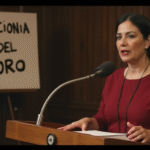Introduction
In Mexico, for many elderly women, identity is not a guaranteed right but a labyrinth filled with closed doors. Traversing the process of obtaining a passport can turn into an ordeal, exposing the flaws of a state that for decades rendered women poor, illiterate, and without documents, who still face discrimination today.
The Case of an 80-Year-Old Woman
I recently learned about the case of an 80-year-old woman who worked for nearly 40 years in the federal government. She is a retired employee with an extensive medical record at the Institute of Security and Social Services of State Workers (ISSSTE).
She possesses a certified Clave Única de Registro de Población (CURP), a Registered Federal Taxpayer (RFC), and an Electoral Credential with photograph issued by the National Electoral Institute (INE).
Born in her forties, she began working in the sixties when it was necessary to obtain a filiación sheet to work in government offices. This document contains her identification details, fingerprints, and a photograph with an uncovered face, without jewelry or makeup.
The issue? She was registered ten years after her birth. This situation, while almost impossible today, was common then. She went to school because her parents supported her education, leading to her registration at the Civil Registry.
Historical Context
Let’s recall some situations common during those times. The City of Mexico was more rural than urban, poverty and ignorance were the norm, unmarried couples with children born outside marriage were common. Sometimes, these children were born without a name because their father did not recognize them, yet they survived on the streets with an alias.
Due to this, her certified birth certificate from the Civil Registry was insufficient for the consular staff. She had to prove her “social footprint” with her baptismal certificate, primary school certificate, parents’ marriage certificate, or the birth certificates of all her siblings.
Would anyone have their baptismal certificate after eighty years? Her siblings and parents have passed away (most due to COVID-19 in 2019), and her surviving brother has a birth certificate registered twenty years after his birth.
Resolution and Broader Implications
After obtaining a primary school certificate replacement from the Secretaría de Educación Pública (SEP), she finally secured her passport and can now visit her grandson in Canada. She also plans to travel to Costa Rica and perhaps even Las Vegas.
However, what about indigenous women from the Guerrero coast? What of single child mothers? Those who couldn’t study due to work requirements in agriculture, without pay or social security?
If an elderly woman who worked her entire life, paid taxes, and exercised her right to vote was questioned and had to prove her “social footprint” for her identity rights, what can less fortunate women expect?
The rules are clear on paper—the Nacionalidad Law Reform during Felipe Calderón’s administration in 2013. Yet, millions of women reach old age without recognition or respect from bureaucracy, enduring a legal ordeal to have their identity rights acknowledged.
Key Questions and Answers
- What is the issue faced by elderly Mexican women in obtaining legal documents? Many women face challenges proving their “social footprint” to obtain identification documents, despite having worked and paid taxes.
- What historical context contributed to this problem? Decades of marginalizing poor, illiterate women without documents led to current discrimination and bureaucratic hurdles.
- What is the significance of the birth certificate and related documents? These documents are crucial for proving identity, but obtaining them can be challenging due to outdated registration practices.
- How does this issue affect various groups of women? The problem disproportionately impacts indigenous women, single child mothers, and those who couldn’t pursue education due to work requirements.
- What are the broader implications of this issue? Millions of women face identity struggles, highlighting systemic issues within Mexican bureaucracy.






